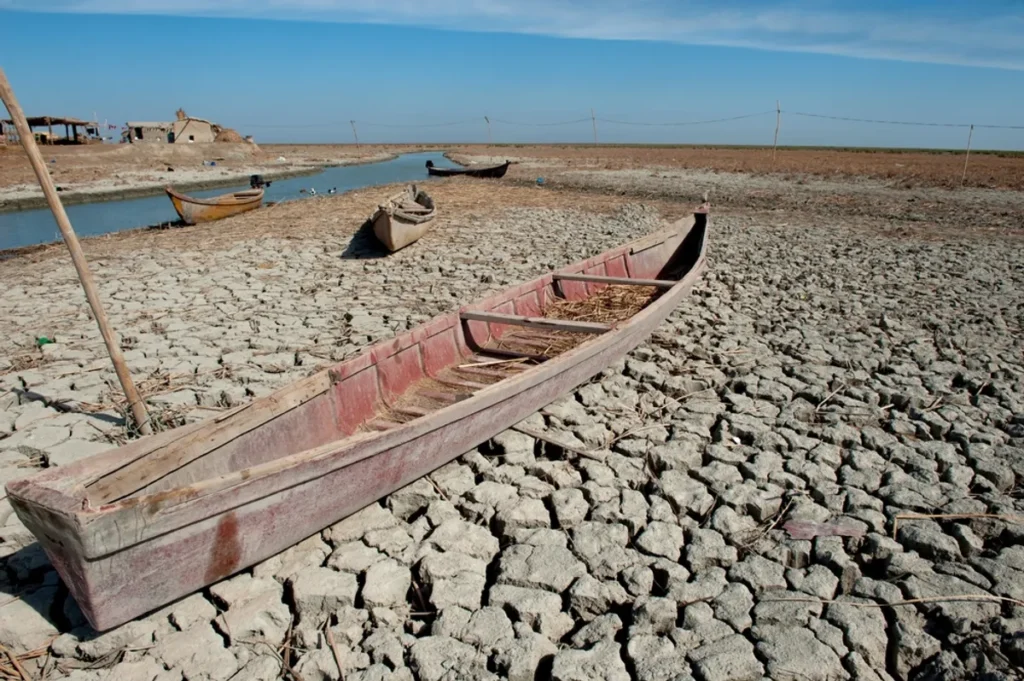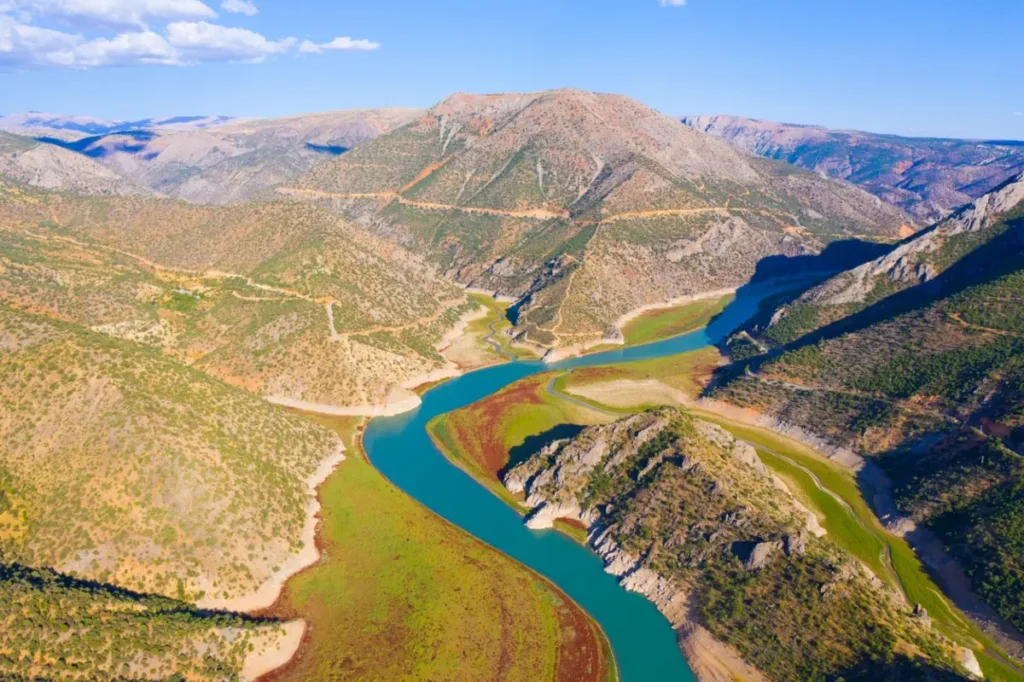
Historical Significance of the Euphrates River
The Euphrates in Ancient Civilizations
In ancient times, the Euphrates River held profound implications for civilizations that thrived along its banks, notably the Mesopotamian civilizations, namely Sumer, Akkad, and Babylonia. These societies relied heavily on the river, as it formed the central vein of their agricultural sustenance and, consequently, their economic vigor. Its vast network of waterways facilitated trade and communication, hence promoting cultural exchange and advancements. Moreover, it bore witness to countless historical narratives, including important biblical events. Thus, the Euphrates River is intrinsically linked with the inception and prosperity of early human civilizations.
The Euphrates as a Supplier of Water for Agriculture
Historically, the Euphrates River has served as a lifeline for civilizations settled around it, primarily as a robust water source imperative for agriculture. Its abundant waters, rich with nutrients, fertilize the earth promoting the growth of staple crops like wheat, barley, lentils, and dates. The advent of irrigation techniques amplified its role, creating a wide agrarian landscape in areas that were once desert. However, recent patterns of significant water reduction have threatened this agricultural sustenance. This culmination of natural and human-induced phenomena has endangered the once-thriving agricultural sector reliant on the Euphrates, redefining its historical significance.
The Euphrates as a Path for Trade and Transport
Stretched across several ancient civilizations like Mesopotamia and Babylonia, the Euphrates River has long served as an indispensable route for trade and transport. Goods like grain, textiles, and even precious stones and metals were routinely transported along its path, fostering economic prosperity and cultural connections. Waterborne vessels facilitated expedient movement of these goods and commodities, significantly boosting local economies. The river’s broad and navigable course also allowed for the easy passage of people, enabling the exchange of ideas and fostering diplomatic relationships. Thus, the Euphrates was not just a river – it served as a lifeline, enhancing trade, transport, and cultural exchange.
The Euphrates River Today
Current Role and Importance of the Euphrates
Despite significant reductions in its water level, the Euphrates River still plays a pivotal role in the areas it traverses. It continues to support agriculture, supplying water for irrigation to vast regions in Syria and Iraq. Many towns and cities along its course also depend on it for their domestic water supply. Furthermore, it hosts numerous hydropower stations that contribute to the power grid of the region. The river is, therefore, a lifeline for millions of people, emphasizing its unquestionable importance in the socio-economic dynamics of the region despite occasional episodes of drying.
Changes in Water Level Measurements
While the Euphrates River hasn’t entirely dried up, its water levels have significantly dwindled over the years. Ongoing research has revealed concerning decreases in water volume, coinciding largely with climate change and human activities that include dams and excessive irrigation. Satellite images from NASA further illustrate how parts that used to be water-rich have now turned considerably arid. Also, measurements and observations from local communities corroborate these findings. This noticeable reduction in water levels not only threatens wildlife and the river’s ecosystem but also disrupts livelihoods that heavily depend on its resources.
Environmental Impacts and their Causes
In recent years, the Euphrates River, once a robust waterway, has been diminished significantly, experiencing noticeable reductions in its water level. The decrease primarily stems from crucial environmental factors, including extensive dam-building upstream, over-extraction for agriculture and consumption, and climate change-induced droughts. Turkish hydraulic projects, like the Southeastern Anatolia Project, have greatly restricted the river’s flow downstream. Furthermore, the extensive agricultural activities in Iraq and Syria heavily rely on the Euphrates, exerting an additional strain on its already depleted resources. Additionally, climate change worsens the situation by causing less rainfall and higher evaporation rates. Consequently, this overexploitation and altered weather patterns have threatened the Euphrates’ vitality.
The Impact of Drought and Conflict
The Influence of Climate Change on the Euphrates
Climate change has gravely impacted the water levels of the Euphrates, one of the largest river systems in the Western Asia. Extended periods of drought, a notable repercussion of global warming, have caused significant water depletion, with the Euphrates not being spared. Extreme weather conditions, coupled with increased evaporation rates, have accelerated the drying process. This has been further amplified by conflict in the region, leading to the misuse and overexploitation of the river as a strategic resource during hostilities. This harmful concoction of climate-related and man-made factors has substantially threatened the Euphrates’ sustainability, leading to severe shortages of water.
Use of the River as a Geopolitical Tool
In a complex confluence of natural and human-made factors, the Euphrates River, one of the most significant waterways in West Asia, has indeed suffered a dramatic reduction in its flow in recent years. Primarily, this drop is a result of severe droughts, with climate change being a major contributor. However, it’s also becoming increasingly clear that this river, serving as a crucial lifeline for millions, is being weaponized for geopolitical purposes. Both Turkey and Syria have built numerous dams along the river, exerting tight control over the river’s water supply. This has led to serious water shortages downstream in Iraq. The river’s current state serves as a tool for diplomacy or conflict, significantly impacting lives, agriculture, and local economies of the dependent regions. Therefore, the decline of the Euphrates River brings to light the disturbing reality of water being used as a pawn in regional power struggles.
Impact of Conflict on the River’s Water Availability
The persistent clashes in the Middle East have drastically affected the Euphrates River’s water volume. Conditions in Syria and Iraq, largely influenced by constant combat, have placed severe stress on the water supply. Notably, dam constructions impede the water flow, causing loss of volume downstream. These dams, often utilized for strategic military advantage, have led to a considerable reduction in the river’s water levels, making certain sections barely navigable. Moreover, the persistent instability makes it challenging to establish and enforce effective water management policies. Consequently, the areas that rely heavily on the Euphrates for their basic supply and irrigation face regular shortages. Furthermore, the infrastructural damage due to warfare magnifies these shortages by disrupting the supply routes. This combination of diminished volume, lack of governance, and the physical scars left by conflict, have resulted in a significant decrease in the Euphrates River’s water availability.
Assessing the Claims of the Euphrates River Drying Up
Evaluating Historical and Scientific Evidence
The substantiation of the claim regarding the drying up of the Euphrates River must take into account both archaeological findings and contemporary scientific data. Archaeological research shows periods of reduced flow in the past due to weather changes, overuse for irrigation, or as a consequence of human intervention. With regard to recent scientific data, studies based on satellite imagery and hydrological data indicate a decline in water levels. However, this reduction, while significant, does not equate to the river running dry completely. The decline is attributed to factors such as climate change, dam constructions, and excessive water extraction. Therefore, while we can confirm a reduction in the river’s flow, it would be inaccurate to purport that the Euphrates River has dried up entirely based on current evidence. Careful monitoring and proper management strategies are necessary to prevent further reduction in water levels.
Understanding Future Projections and Implications
While it is alarming to consider, multiple studies suggest that the Euphrates River, one of the cradles of ancient civilizations, is indeed at risk of drying up in the near future. Its volumetric flow rate has notably reduced over the past few decades, primarily due to increasing water demand, climate change, and dam constructions. Future projections, based on current climatic trends and water usage rates, hint towards a continuous decline in river water. This could pose serious ecological, agricultural and geopolitical consequences. Drying can disrupt the ecological balance, endangering numerous species that depend on the river ecosystem. It can also aggravate already tense water-sharing negotiations among Turkey, Syria, and Iraq. Lastly, agriculture-dependent economies along the river basin might suffer substantially, intensifying food security issues. Such far-reaching implications underline the importance of sustainable water management and international cooperation in preserving this historic river.
Taking Action for a Sustainable Euphrates
Role of Government Policies and Agreements
The significance of national strategies and international treaties cannot be understated when discussing the preservation of the Euphrates River. Historically, water resource management has often been contentious between nations sharing transboundary water bodies. Various countries, especially Turkey, Syria, and Iraq, that use the river as a primary water source, have undertaken numerous agreements and protocols to regulate and balance water usage. Over exploitation and failure to adhere to the agreed-upon terms have resulted in decreased water levels, indicating an urgent need for sustainable policies. The enforcement of strict legislation and cooperation to ensure equitable use and conservation of the river is thus paramount.
Importance of Individual and Community Efforts
Community collaboration and individual efforts significantly factor into championing sustainable use and preservation of the Euphrates River. It’s crucial to understand and uphold its central role as a lifeline for millions. Locals, by actively regulating their water usage and promoting an eco-conscious lifestyle, can directly contribute to the sustainability cause. Similarly, community-led initiatives could highlight awareness and education concerning the river’s health, creating ripple effects throughout the region. Additionally, supporting policies for better water management and strategic water distribution can prompt governmental actions further ensuring the river’s vitality. Together, we can aid in preventing the Euphrates River from drying up and secure the future of this vital water source.



